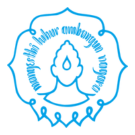Nurse Professionalism in Law Perspective: Risk Management of Occupational Health and Safety in the Hospital
Abstract
Background: Law number 38/2014 on nursing requires nurses to provide professional services. Unprofessional nurse increases health and safety risk of themselves. This study aimed to describe nursing professionalism in occupational health and safety risk management at PKU Muhammadiyah Hospital, Karanganyar, Central Java.
Subjects and Method: This was a descriptive qualitative. The study was conducted at PKU Muhammadiyah hospital, Karanganyar, Central Java, from December 2018 to February 2019. There were 6 key informants selected for this study, including (1) Infection prevention and control committee, (2) Head of hospital health promotion, (3) Head division of access to hospitals and continuity of service, (4) Head of patient and family rights, (5) Head division of nursing, and (6) Head division of occupational health and safety. A sample of 50 nurses from 7 wards was selected to measure their attitude toward risk management of occupational health and safety. The study sample was selected randomly. Patients were included to describe the quality of health service from their perspective. The data were collected by structured interview and analyzed by triangulation.
Results: Nursing professionalism in occupational health and safety risk management at PKU Muhammadiyah Hospital was good. In order to maintain and improve nursing professionalism, internal hospital training and regular coordination meeting were conducted, involving ward nurses and heads, and nursing committee. Occupational health and safety risks were minimal. Near-miss and accident cases were recorded and followed up for future preventive purpose.
Conclusion: Nursing professionalism in occupational health and safety risk management at PKU Muhammadiyah Hospital is good. Some preventive measures had been taken to minimize occupational health and safety risk.
Keywords: nursing, professionalism, risk management
Correspondence: Dewi Arradini. School of Health Sciences Mitra Husada. Jl. Achamad Yani 167, Papahan, Tasikmadu, Karanganyar, Surakarta, Central Java. Email: dewiarra29@gmail.com. Mobile: 08994194149.
Journal of Health Policy and Management (2020), 05(03): 174-179
https://doi.org/10.26911/thejhpm.2020.05.03.02
How to Cite
References
Bang KS, Kang JH, Jun MH, Kim HS, Son HM, Yu SJ, Kwon MK, Kim JS (2011). Professional values in Korean undergraduate nursing students. Nurse Educ Today. 31(1): 72-5. doi: 10.1016/j.nedt.2010.03.019.
Bunkenborg G, Samuelson K, Akeson J, Poulsen I (2012). Impact of professionalism in nursing on inhospital bedside monitoring practice. Journal of Advanced Nursing. 69(7): 1466–1477. doi: 10.1111/jan.12003.
Edelstein SB, Stevenson JM, Broad K (2005). Teaching professionalism during anesthesiology training. J Clin Anesth. 17(5): 392-8. https://doi.org/10.1016/j.jclinane.2004.10.006.
Ghadirian F, Salsali M, Cheraghi MA (2014). Nursing professionalism: An evolutionary concept analysis. Iran J Nurs Midwifery Res. 19(1): 1–10.
Indonesian Ministry of Health (2016). Peraturan Menteri Kesehatan Republik Indonesia Nomor 66 Tahun 2016 tentang Keselamatan dan Kesehatan Kerja Rumah Sakit
Laschinger HK, Finegan J (2005). Using empowerment to build trust and respect in the workplace: a strategy for addressing the nursing shortage. Nurs Econ. 23(1): 6-13.
Lucchini RG, London L (2014). Global occupational health: Current challenges and the need for urgent action. Annals of Global Health. 80(4): 251-256. https://doi.org/10.1016/j.aogh.2014.09.006.
Pandit MS, Pandit S (2009). Medical negligence: Coverage of the profession, duties, ethics, case law, and enlightened defense A legal perspective. Indian J Urol. 25(3): 372–378. doi: 10.4103/0970-1591.56206.
Pool IA, Poell RF, ten Cate TJ (2013). Perspectives on age and continuing professional development for nurses: A literature review. Vocations and Learning 6: 297–32. https://doi.org/10.1007/s12186-013-9096-2.
Poorchangizi B, Borhani F, Abbaszadeh A, Mirzaee M, Farokhzadian J (2019). Professional values of nurses and nursing students: A comparative study. BMC Med Educ. 19: 438. https://doi.org/10.1186/s12909-019-1878-2.
Rahman MM, Shahidullah M, Shahiduz zaman M, Rashid HA (2002). Quality of health care from patient perspectives. Bangladesh Med Res Counc Bull. 28(3): 87-96.
Regula CG, Miller JJ, Mauger DT, Marks JG (2007). Quality of care from a patient’s perspective. Arch Dermatol. 143(12): 1589-1603. doi:10.1001/archderm.143.12.1592.
Shohani M, Zamanzadeh V (2017). Nurses' attitude towards professionalization and factors influencing it. J Caring Sci. 6(4): 345–357. https://dx.doi.org/10.15171%2Fjcs.2017.033.
Sodeify R, Vanaki Z, Mohammadi E (2013). Nurses’experiences of perceived support and their contributing factors: A qualitative content analysis. Iran J Nurs Midwifery Res. 18(3): 191–197. https://www.ncbi.nlm.nih.gov/pubmed/23983753.
van Mook WN, de Grave WS, Wass V, O'Sullivan H, Zwaveling JH, Schuwirth LW, van der Vleuten CP (2009). Professionalism: evolution of the concept. Eur J Intern Med. 20(4): e81-4. doi: 10.1016/j.ejim.2008.10.005.
Weis D, Schank MJ (2000). An instrument to measure professional nursing values. J Nurs Scholarsh. 32(2): 201-4. https://doi.org/10.1111/j.1547-5069.2000.00201.x.
Presiden Republik Indonesia (1970). Undang-Undang Republik Indonesia Nomor 1 Tahun 1970 Tentang Keselamatan Kerja





